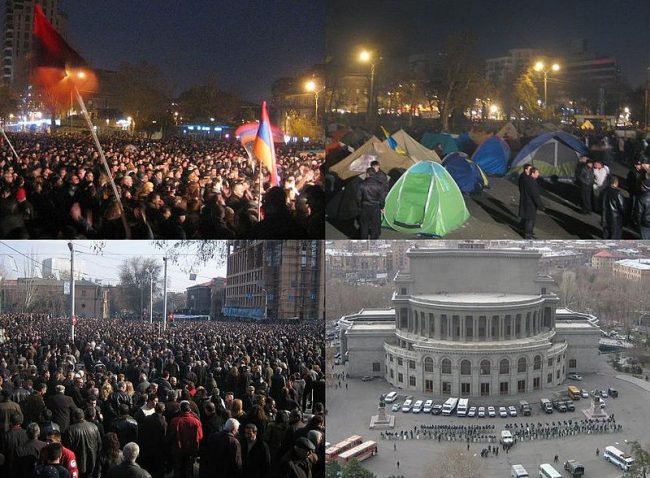

 Armenia’s parliament is to discuss an opposition resolution seeking ‘justice’ for those killed during a violent crackdown on protests in 2008, RFE/RL’s Armenian service Azatutyun reports. The resolution comes ten years after the deadly Yerevan protests, while a case into the matter at the ECHR is still pending.
Armenia’s parliament is to discuss an opposition resolution seeking ‘justice’ for those killed during a violent crackdown on protests in 2008, RFE/RL’s Armenian service Azatutyun reports. The resolution comes ten years after the deadly Yerevan protests, while a case into the matter at the ECHR is still pending.
In March 2008, peaceful anti-government protests were forcibly dispersed by the authorities, resulting in the deaths of 10 people, both during the protests and in the following days. A case against Armenia at the European Court of Human Rights (ECHR) is still pending.
According to Azatutyun, the resolution put forward by the Yelk party, condemns the use of lethal force against protesters in the wake of the 19 February 2008 presidential election in Armenia.
According to them, the motion submitted to parliament on 27 February calls for the authorities to ‘identify and prosecute’ people responsible for the deaths during a ‘crude and illegal’ crackdown.
Parliament voted to include the motion in its agenda despite objections from the Committee of Legal Affairs, according to Caucasian Knot. The date for parliamentary discussions has not yet been set.
The crackdown
The 2008 Yerevan protests were sparked after former President Levon Ter-Petrosyan, President Serzh Sargsyan’s main competitor, claimed the elections had been fixed.
After Ter-Petrosyan, who served as the first President of Armenia between 1991 and 1998, called on supporters to gather in the city’s central Opera Square, nationwide protests broke out. The initial protests were reportedly authorised by the authorities, and were then followed by ‘spontaneous’ protests. The authorities did not intervene until 1 March, according to allegations against Armenia, as written in the ECHR case.
After Armenia’s Central Election Commission announced on 24 February that then Prime Minister Sargsyan had won the majority of votes, protests continued.
The families of those killed in the protests claim that police ‘without any prior warning or orders to disperse, unexpectedly attacked’ hundreds of demonstrators in Yerevan’s Freedom Square and ‘started beating them with rubber truncheons, causing them bodily injuries and destroying their tents’.
Outgoing President Robert Kocharyan then declared a state of emergency, which was followed by dispersion of protesters. A number of prominent opposition politicians were arrested in the aftermath.
According to Azatutyun, Sargsyan was accused in parliament last week of ‘seizing power only thanks to those killings’. A number of MPs objected to this, with one MP from the ruling Republican Party defending the crackdown, claiming that protesters shot at security forces during the protests. Sargsyan was subsequently re-elected in 2013.
The ECHR case
Of the families of the 10 deceased, nine appealed to the European Court of Human Rights (ECHR) in 2011, according to the European Human Rights Advocacy Centre (EHRAC), who is representing them in court. EHRAC is a London-based rights group which assists NGOs in Russia, the Caucasus, and Ukraine take cases to the ECHR.
EHRAC argues that the deaths ‘resulted from use of force which was not absolutely necessary’. They also say the ‘authorities have failed to carry out an effective investigation into the circumstances’.
Vahe Grigoryan, a legal consultant at EHRAC, said in a 1 March statement that the cases ‘are of crucial importance for Armenian society as a whole’, adding that the families are relying on the court to establish what happened ten years ago.
‘On a larger scale, this case is about a direct attack on democratic protests by the ruling regime by use of lethal force against protesters, who were standing in defence of their civil and political rights’, Grigoryan said.









